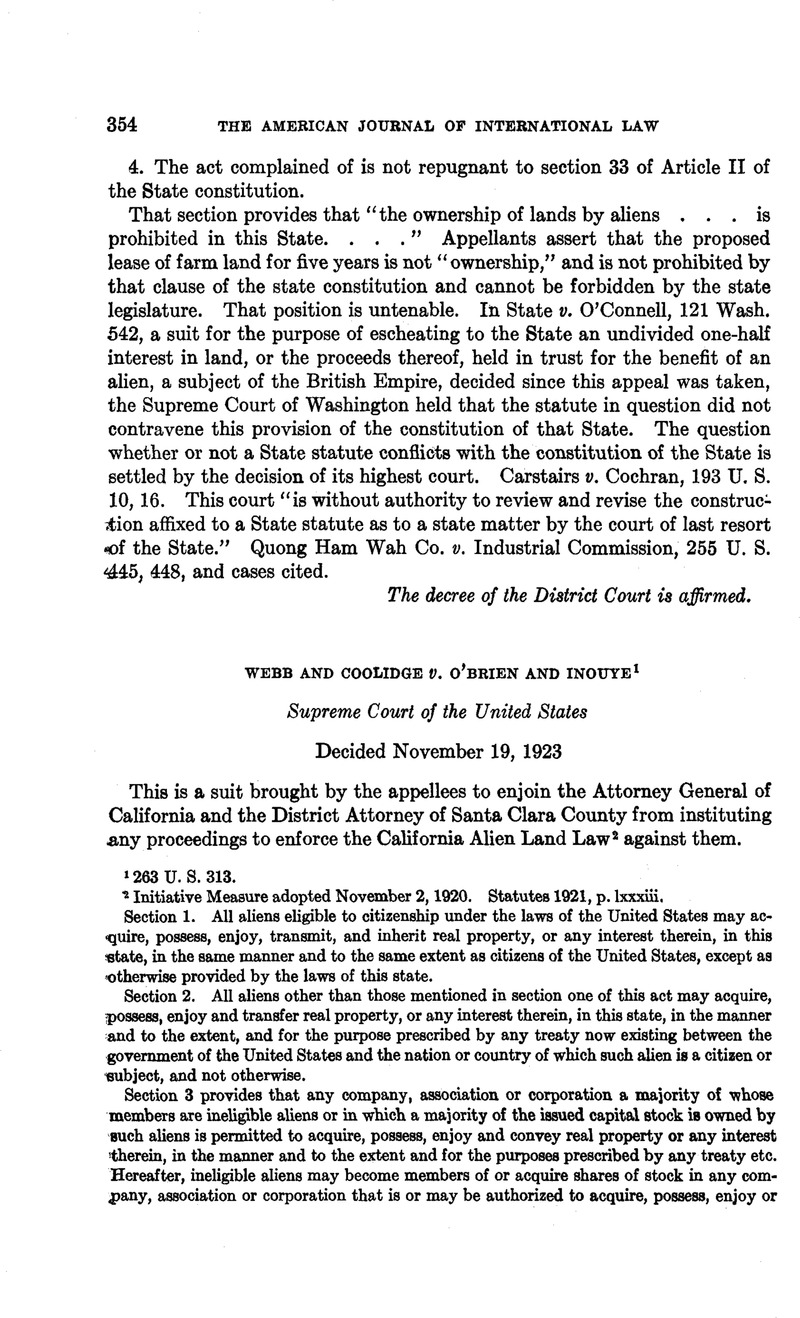No CrossRef data available.
Published online by Cambridge University Press: 04 May 2017

263 U. S. 313.
2 Initiative Measure adopted November 2,1920. Statutes 1921, p. lxxxiii.
Section 1. All aliens eligible to citizenship under the laws of the United States may acquire, possess, enjoy, transmit, and inherit real property, orany interest therein, in this state, in the same manner and to the same extent as citizens of the United States, except as otherwise provided by the lawsof this state.
Section 2. All aliens other than those mentionedin section one of this act may acquire, possess, enjoy and transfer real property, or any interest therein, in this state, in the manner and to the extent, and for the purpose prescribed by any treaty nowexisting between the government of the United States and the nation or country of which such alien is a citizen or subject, and not otherwise.
Section 3 provides that any company, associationor corporation a majority of whose members are ineligible aliens or in which a majority of the issued capital stock is owned by such aliens is permitted to acquire, possess, enjoy and convey real property or any interest therein, in the manner and to the extent and for the purposes prescribed by any treaty etc. Hereafter, ineligible aliens may become members of or acquire shares of stock in any company, association or corporation that is or may be authorized to acquire, possess, enjoy orconvey agricultural land, in the manner and to the extent and for the purposes prescribed by any treaty . . . and not otherwise.
Section 4 provides that no ineligible alien and no company, association or corporation mentioned insection 3 may be appointed guardian of that portion of the estate of a minor which consists of property which such alien or such company, association or corporation is inhibited from acquiring, possessing, enjoying or transferring by reason of the provisions of the act. The superior court may remove the guardian of such an estate whenever it appears to the satisfaction of the court that facts exist which would make the guardian ineligible to appointment in the first instance.
Section 5 (a). The term “ trustee” as usedin this section means any person, company, association or corporation that as guardian, trustee, attorney-in-fact or agent, or in any other capacity has the title, custody or control of property, or some interest therein, belonging to an ineligible alien or to the minor child of such an alien, if the property is of such a character that such alien is inhibited from acquiring, possessing, enjoying or transferring it. . . . (b). Annually every such trustee must file a verified written report showing: . . . (3). An itemized account of all expenditures, investments, rents, issues and profits in respect to theadministration and control of such property with particular reference to holdings of corporate stock and leases, cropping contracts and other agreements in respect to land and the handling or sale of products thereof is required of such trustee.
Section 6 provides for sale and distribution of proceeds when, by reason of the provisions of the act, heir cannot take real property or membership orshares of stock in a company, association or corporation.
Section 7 provides for the escheat of property acquired in fee by any ineligible alien and that no alien, company, assocation or corporation mentionedin section 2 or section 3 hereof shall hold for a longer period than two years, the possession of any agricultural land acquired in the enforcement of orin satisfaction of a mortgage or other lien hereafter made or acquired in good faith to secure a debt.
Section 8. Any leasehold or other interest in real property less than a fee, hereafter acquired in violation of the provisions of this act by any ineligible alien or by any company, association or corporation mentioned in section 3 of this act, shall escheat to the State of California. . . . Any share of stock or interest of any member in a company, association or corporation hereafter acquired in violation of the provisions of section 3 of this act shall escheat to the state of California.
Section 9. Every transfer of real property, or of an interest therein, though colorable in form, shall be void as to the state and the interest thereby conveyed or sought to be conveyed shall escheat to the state if the property interest involved is ofsuch a character that an ineligible alien is inhibited from acquiring, possessing, enjoying or transferring it, and if the conveyance is made with intentto prevent, evade or avoid escheat as provided for herein.
Section 10. If two or more persons conspire to effect a transfer of real property, or of an interest therein, in violation of the provisions hereof, they are punishable by imprisonment in the county jail or state penitentiary not exceeding two years, or by a fine not exceeding five thousand dollars, orboth.
3 Article I. The citizens or subjects of each of the High Contracting Parties shall have liberty to enter, travel and reside in the territories of the other to carry on trade, wholesale and retail, to own or lease and occupy houses, manufactories, warehouses and shops, to employ agents of their choice, to lease land for residential and commercial purposes, and generally to do anything incident to or necessary for trade upon the same terms as native citizens or subjects, submitting themselves to the laws and regulations there established.